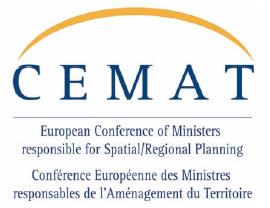1st Conference of the Council of Europe of Ministers Responsible for Spatial Planning (CEMAT)
Foundations of a European regional planning policy
Bonn, Federal Republic of Germany, 9-11 September 1970

Considered as “One of the essential political tasks”, planning should be done via the development of less advanced areas, the economic integration of natural areas divided by borders, and by a balance between urban and rural areas, as well as between economy and ecology.
The conference took into account the basic factors in building a balanced development in the European zone:
- environment quality;
- urbanisation and town–countryside balance;
- problems of rural areas;
- problems specific to some regions (border regions, mountain regions, rural areas with difficult access, industrial redeployment areas, internal peripheral regions of states);
- problems of European peripheral areas;
- communications and transport network;
- the population’s participation through regional and local communities.
The ministers defined the fundamental factors of European co-operation in the field of regional planning, with the aim of guaranteeing a better balance in the European zone and harmonious development of its various regions. They therefore decided to co-operate in the following fields:
- agreement in the field of prospective research and in creating a regular collaboration of public research bodies that participate in spatial planning;
- co-ordination of plans and various measures concerning spatial planning;
- meetings and exchanges between persons in charge and researchers in the field of spatial planning;
- harmonisation of terminology, statistics and cartographic methods.
In that sense, it was considered necessary:
- to prepare a list of spatial planning problems to deal with at the European level;
- to identify, among these problems, the ones that are of interest for preparing a conference;
- to study together with the Council of Europe Co-operation Committee for Municipal and Regional Matters the tasks specific to local authorities in spatial planning policy.



